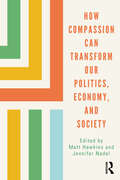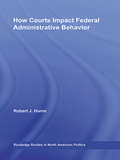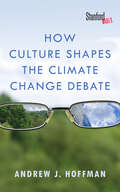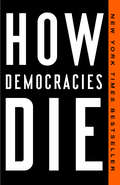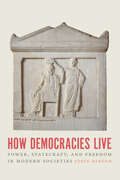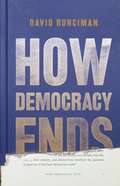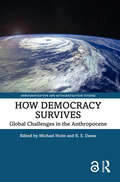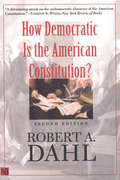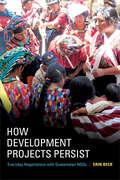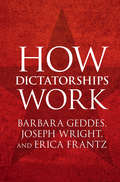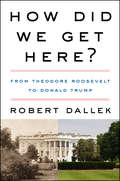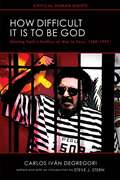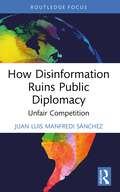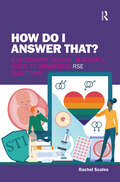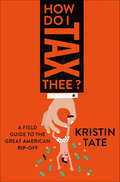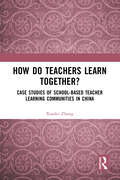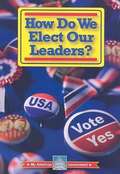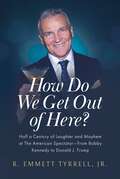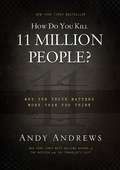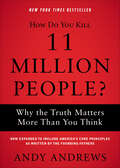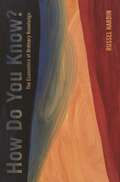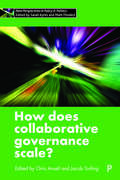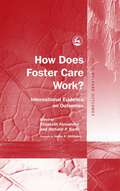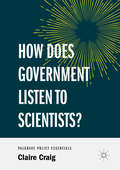- Table View
- List View
How Compassion can Transform our Politics, Economy, and Society
by Matt Hawkins Jennifer NadelHow Compassion can Transform our Politics, Economy, and Society draws together experts across disciplines – ranging from psychology to climate science, philosophy to economics, history to business – to explore the power of compassion to transform politics, our society, and our economy. The book shows that compassion can be used as the basis of a new political, economic, and social philosophy as well as a practical tool to address climate breakdown, inequality, homelessness, and more. Crucially, it also provides a detailed plan for its execution. It marks the first time that the study of compassion has been applied across multiple disciplines. The book provides a template for the study of compassion on an interdisciplinary basis and will appeal to academics, professionals, and the general reader searching for a fresh and inspiring approach to the seemingly intractable problems facing the world.
How Courts Impact Federal Administrative Behavior (Routledge Studies in North American Politics)
by Robert J. HumeWhat impact do federal courts have on the administrative agencies of the federal government? How do agencies react to the decisions of federal courts? This book answers these questions by examining the responses of federal agencies to the U.S. Courts of Appeals, revealing what happens inside agencies after courts rule against them. Robert J. Hume draws upon dozens of interviews with current and former administrators, taking readers behind the scenes of these organizations to reveal their internal procedures, their attitudes about courts, and their surprising capacity to be influenced by a judge’s choice of words. This fascinating study will be of interest to students and scholars of politics as well as those seeking great understanding of the intricacies of the US political system.
How Culture Shapes the Climate Change Debate
by Andrew J. HoffmanThough the scientific community largely agrees that climate change is underway, debates about this issue remain fiercely polarized. These conversations have become a rhetorical contest, one where opposing sides try to achieve victory through playing on fear, distrust, and intolerance. At its heart, this split no longer concerns carbon dioxide, greenhouse gases, or climate modeling; rather, it is the product of contrasting, deeply entrenched worldviews. This brief examines what causes people to reject or accept the scientific consensus on climate change. Synthesizing evidence from sociology, psychology, and political science, Andrew J. Hoffman lays bare the opposing cultural lenses through which science is interpreted. He then extracts lessons from major cultural shifts in the past to engender a better understanding of the problem and motivate the public to take action. How Culture Shapes the Climate Change Debate makes a powerful case for a more scientifically literate public, a more socially engaged scientific community, and a more thoughtful mode of public discourse.
How Democracies Die: What History Reveals About Our Future
by Daniel Ziblatt Steven Levitsky<P>A bracing, revelatory look at the demise of liberal democracies around the world—and a road map for rescuing our own Donald Trump’s presidency has raised a question that many of us never thought we’d be asking: Is our democracy in danger? <P>Harvard professors Steven Levitsky and Daniel Ziblatt have spent more than twenty years studying the breakdown of democracies in Europe and Latin America, and they believe the answer is yes. Democracy no longer ends with a bang—in a revolution or military coup—but with a whimper: the slow, steady weakening of critical institutions, such as the judiciary and the press, and the gradual erosion of long-standing political norms. <P>The good news is that there are several exit ramps on the road to authoritarianism. The bad news is that, by electing Trump, we have already passed the first one. Drawing on decades of research and a wide range of historical and global examples, from 1930s Europe to contemporary Hungary, Turkey, and Venezuela, to the American South during Jim Crow, Levitsky and Ziblatt show how democracies die—and how ours can be saved. <P><b>A New York Times Bestseller</b>
How Democracies Live: Power, Statecraft, and Freedom in Modern Societies
by Stein RingenTimes have not been kind to democracy. This book is in its defense. In the new century, the triumph of democracy at the end of the Cold War turned to retrenchment. The core democracies, in America and Britain, succumbed to polarization and misrule. Dictatorships, such as China, made themselves assertive. New democracies in Central Europe turned to muddled ideologies of “illiberal democracy.” In this book, Stein Ringen offers a meditation on what democracy is, the challenges it faces, and how it can be defended. Ringen argues that democracy must be rooted in a culture that supports the ability of citizens to exchange views and information among themselves and with their rulers. Drawing on the ideas of Machiavelli, Aristotle, Tocqueville, Max Weber, and others, Ringen shows how power is the fuel of government, and statecraft turns power into effective rule. Democracy should prize freedom and minimizing unfairness, especially poverty. Altogether, Ringen offers powerful insight on the meaning of democracy, including a new definition, and how countries can improve upon it and make it function more effectively. Timely and thought-provoking, How Democracies Live is a sober reminder of the majesty of the democratic enterprise.
How Democracy Ends
by David RuncimanHow will democracy end? And what will replace it? A preeminent political scientist examines the past, present, and future of an endangered political philosophySince the end of World War II, democracy's sweep across the globe seemed inexorable. Yet today, it seems radically imperiled, even in some of the world's most stable democracies. How bad could things get?In How Democracy Ends, David Runciman argues that we are trapped in outdated twentieth-century ideas of democratic failure. By fixating on coups and violence, we are focusing on the wrong threats. Our societies are too affluent, too elderly, and too networked to fall apart as they did in the past. We need new ways of thinking the unthinkable--a twenty-first-century vision of the end of democracy, and whether its collapse might allow us to move forward to something better.A provocative book by a major political philosopher, How Democracy Ends asks the most trenchant questions that underlie the disturbing patterns of our contemporary political life.
How Democracy Survives: Global Challenges in the Anthropocene (Democratization and Autocratization Studies)
by R. S. Deese Michael HolmHow Democracy Survives explores how liberal democracy can better adapt to the planetary challenges of our time by evolving beyond the Westphalian paradigm of the nation state. The authors bring perspectives from Africa, Asia, Europe, Latin America, and North America, their chapters engaging with the concept of transnational democracy by tracing its development in the past, assessing its performance in the present, and considering its potential for survival in this century and beyond. Coming from a wide array of intellectual disciplines and policymaking backgrounds, the authors share a common conviction that our global institutions—both governments and international organizations—must become more resilient, transparent, and democratically accountable in order to address the cascading political, economic, and social crises of this new epoch, such as climate change, mass migration, more frequent and severe natural disasters, and resurgent authoritarianism. This book will be relevant for courses in international relations and political science, environmental politics, and the preservation of democracy and federalism around the world.
How Democratic Is the American Constitution?
by Robert A. DahlDahl starts with the assumption that the legitimacy of the American Constitution derives solely from its utility as an instrument of democratic governance. Dahl demonstrates that, due to the context in which it was conceived, our Constitution came to incorporate significant antidemocratic elements. Because the Framers of the Constitution had no relevant example of a democratic political system on which to model the American government, many defining aspects of our political system were implemented as a result of short-sightedness or last-minute compromise.
How Democratic Is the American Constitution?
by Robert A. DahlIn this provocative book, one of our most eminent political scientists poses the question, "Why should we uphold our constitution?" The vast majority of Americans venerate the American Constitution and the principles it embodies, but many also worry that the United States has fallen behind other nations on crucial democratic issues, including economic equality, racial integration, and women's rights. Robert Dahl explores this vital tension between the Americans' belief in the legitimacy of their constitution and their belief in the principles of democracy. Dahl starts with the assumption that the legitimacy of the American Constitution derives solely from its utility as an instrument of democratic governance. Dahl demonstrates that, due to the context in which it was conceived, our constitution came to incorporate significant antidemocratic elements. Because the Framers of the Constitution had no relevant example of a democratic political system on which to model the American government, many defining aspects of our political system were implemented as a result of short-sightedness or last-minute compromise. Dahl highlights those elements of the American system that are most unusual and potentially antidemocratic: the federal system, the bicameral legislature, judicial review, presidentialism, and the electoral college system. The political system that emerged from the world's first great democratic experiment is unique-no other well-established democracy has copied it. How does the American constitutional system function in comparison to other democratic systems? How could our political system be altered to achieve more democratic ends? To what extent did the Framers of the Constitution build features into our political system that militate against significant democratic reform? Refusing to accept the status of the American Constitution as a sacred text, Dahl challenges us all to think critically about the origins of our political system and to consider the opportunities for creating a more democratic society.
How Development Projects Persist: Everyday Negotiations with Guatemalan NGOs
by Erin BeckIn How Development Projects Persist Erin Beck examines microfinance NGOs working in Guatemala and problematizes the accepted wisdom of how NGOs function. Drawing on twenty months of ethnographic fieldwork, she shows how development models and plans become entangled in the relationships among local actors in ways that alter what they are, how they are valued, and the conditions of their persistence. Beck focuses on two NGOs that use drastically different methods in working with poor rural women in Guatemala. She highlights how each program's beneficiaries—diverse groups of savvy women—exercise their agency by creatively appropriating, resisting, and reinterpreting the lessons of the NGOs to match their personal needs. Beck uses this dynamic—in which the goals of the developers and women do not often overlap—to theorize development projects as social interactions in which policymakers, workers, and beneficiaries critically shape what happens on the ground. This book displaces the notion that development projects are top-down northern interventions into a passive global south by offering a provocative account of how local conditions, ongoing interactions, and even fundamental tensions inherent in development work allow such projects to persist, but in new and unexpected ways.
How Dictatorships Work: Power, Personalization, and Collapse
by Barbara Geddes Joseph Wright Erica FrantzThis accessible volume shines a light on how autocracy really works by providing basic facts about how post-World War II dictatorships achieve, retain, and lose power. The authors present an evidence-based portrait of key features of the authoritarian landscape with newly collected data about 200 dictatorial regimes. They examine the central political processes that shape the policy choices of dictatorships and how they compel reaction from policy makers in the rest of the world. Importantly, this book explains how some dictators concentrate great power in their own hands at the expense of other members of the dictatorial elite. Dictators who can monopolize decision making in their countries cause much of the erratic, warlike behavior that disturbs the rest of the world. By providing a picture of the central processes common to dictatorships, this book puts the experience of specific countries in perspective, leading to an informed understanding of events and the likely outcome of foreign responses to autocracies.
How Did We Get Here?: From Theodore Roosevelt to Donald Trump
by Robert DallekThe award-winning, New York Times bestselling historian considers the vast array of triumphs and failures of America’s modern presidents that paved a path to Donald Trump, offering an understanding of our current moment and hope for a way back to true leadership.The struggle to preserve the Republic has never been easy or without perils. The rise of conflicting political parties, which the founders opposed, and President John Adams’ Alien and Sedition Acts repressing First Amendment rights made Franklin’s observation at the conclusion of the Constitutional Convention—“a republic, if you can keep it”—seem prescient.In the twentieth century, America endured numerous struggles: economic depression, World War II, McCarthyism, the Vietnam War, Watergate, the Iran-contra scandal, the war in Iraq—all of which gave rise to demagogues, as did the growth and reach of mass media. But this wasn’t the Founding Fathers’ vision for our leadership. The resistance to putting a demagogue in the White House survived the anti-Communist agitation of the 1950s and the Vietnam War in the 1960s. But the latter opened the way for Richard Nixon’s election in 1968 and Watergate, which again tested our democratic institutions and the rule of law. Nixon’s resignation in August 1974 moved Vice President Gerald Ford, his successor, to declare, “My fellow Americans, our long national nightmare is over.”But was it? Donald Trump’s 2016 election has presented a new challenge. How did past politics and presidential administrations pave the way for this current assault on American democracy? Our nation’s history provides reassurance that we will restore our better angels to government. Yet it must be considered that earlier administrations and public outlook facilitated the rise of such an un-presidential character as Trump in the first place. In How Did We Get Here?, Robert Dallek considers a century of modern administrations, from Teddy Roosevelt to today, shining a light on the personalities behind the politics and the voters who elected each. His cautionary tale reminds us that the only constant in history is change, but whether for good or ill the choice is Americans’ to make.
How Difficult It Is to Be God
by Carlos Iván DegregoriThe revolutionary war launched by Shining Path, a Maoist insurgency, was the most violent upheaval in modern Peru’s history, claiming some 70,000 lives in the 1980s–1990s and drawing widespread international attention. Yet for many observers, Shining Path’s initial successes were a mystery. What explained its cult-like appeal, and what actually happened inside the Andean communities at war? InHow Difficult It Is to Be God,Carlos Iván Degregori—the world’s leading expert on Shining Path and the intellectual architect for Peru’s highly regarded Truth and Reconciliation Commission—elucidates the movement’s dynamics. An anthropologist who witnessed Shining Path’s recruitment of militants in the 1970s, Degregori grounds his findings in deep research and fieldwork. He explains not only the ideology and culture of revolution among the insurgents, but also their capacity to extend their influence to university youths, Indian communities, and competing social and political movements. Making Degregori’s most important work available to English-language readers for the first time, this translation includes a new introduction by historian Steve J. Stern, who analyzes the author’s achievement, why it matters, and the debates it sparked. For anyone interested in Peru and Latin America’s age of “dirty war,” or in the comparative study of revolutions, Maoism, and human rights, this book will provide arresting new insights.
How Disinformation Ruins Public Diplomacy: Unfair Competition (Politics, Media and Political Communication)
by Juan Luis Manfredi SánchezHow Disinformation Ruins Public Diplomacy evaluates and analyzes how Chinese and Russian public diplomacy strategies differ from the existing academic literature and debates, specifically in the context of the new disinformation era.In the context of mediatized public diplomacy, disinformation, and deglobalization, this book asks: do China, Russia, and new emerging powers take advantage by employing values and techniques attributed to public diplomacy? What if goals (dialogue and cooperation) are settled on an unfair basis (false content, meddling, and institutional erosion)? Can their repertoire of actions be considered public diplomacy? And if their initiatives are not public diplomacy, what impact do their actions have on the theoretical construction of the discipline? While using China and Russia as the two main case studies in order to develop a new theory, this book covers other relevant cases on the management of public diplomacy for other purposes. The case of Turkey provides a model of transformation and adaptation of public diplomacy, with Erdogan's hyper-leadership built on anti-Western rhetoric and the emergence of a new Ottomanism. The case of India explores Modi’s creation of an ethnically-branded democracy which places Hinduism at the heart of political decisions. In the case of Morocco, its positioning in religious dialogue, the establishment of relations and political normalization with Israel, and territorial unity (Western Sahara) are explored.Exploring how authoritarian powers abuse the global disinformation order to achieve their public diplomacy goals, this book will be of great interest to students and scholars of international relations, politics, public diplomacy, communication studies, and social theory. In the professional sphere it will also appeal to politicians, diplomats, foreign policy makers, think-tanks, journalists, and foreign correspondents.
How Do I Answer That?: A Secondary School Teacher's Guide to Answering RSE Questions
by Rachel ScalesWhen it comes to those difficult questions about sex and relationships, how do you strike the balance between an answer that is professional but open, correct but doesn’t create panic? Aimed at secondary teachers and trainees, as well as being useful for parents and those working in charities and the voluntary sector, this book covers all the mandatory topics of the new RSE curriculum. Each chapter includes a full list of the questions to be tackled, teacher guidance highlighting important points, and model answers. Diagrams and photos are included to aid understanding and there is helpful signposting to further reading. Potentially unfamiliar topics, such as laws surrounding sexting and LGBTQ+ terminology, are clearly explained and common misconceptions and myths are dispelled.Based on years of experience, this handy text provides clear answers to the questions young people ask about RSE to help you increase your knowledge, gain confidence and ensure pupils receive the most accurate and up to date information.
How Do I Tax Thee?: A Field Guide to the Great American Rip-Off
by Kristin TateLibertarian journalist Kristin Tate provides a look into the wild world of frivolous taxation, aimed at educating members of her own generation in the evils of big government.In How Do I Tax Thee?, libertarian commentator and rising media star Kristin Tate takes us on a tour of the ways the government bleeds us dry in innumerable daily transactions and at various stages of life. We all know the government taxes our pay: federal, state, and local taxes are withheld by employers, as are social security payments. But what about the many other ways the government drains money from our wallets? Have you studied your cell phone bill? Customers in New York State pay an average of 24.36% in federal, state and local taxes on their wireless bills. They’re also charged for obscure services they didn’t ask for and don’t understand like a universal service fund fee, an FCC compliance fee, a line service fee, and an emergency services fee. These aren’t taxes, strictly speaking. The government imposes these administrative and regulatory costs, and your wireless provider passes them along to you. But the effect is exactly the same. What about your cable bill? Your power bill? Your water bill? The cost of a gallon of gas, a cab ride, a hotel stay and a movie ticket are all inflated by hidden fees. How much of what you pay at the pump, the box office, or the airport is really an indirect tax? In a series of short, pointed, fact-laden, humorous chapters, Tate exposes the vast government shakedown that consumes up to half of your income—and also explains where these hidden fees and taxes come from.
How Do Teachers Learn Together?: Case Studies of School-based Teacher Learning Communities in China
by Xiaolei ZhangBased on case studies of Chinese teachers in Shanghai and their workplace learning within the context of reform, this book examines how Chinese teachers learn together when they engage in school-based learning activities. Since the New Curriculum Reform in China in 2001, school-based teaching research groups (TRGs) (Jiaoyanzu) have played an important role in changing teacher learning approaches. Informed by organizational learning frameworks and organizational knowledge theory, the author examines the processes and effects of teacher learning in school-based settings, particularly the role of school leadership in the learning and change of in-service teachers. Implications of sustainably optimizing the school-based teacher learning communities for school improvement are also discussed. The book will be helpful and valuable for policymakers, school leaders, researchers, students, teachers, and other educational practitioners in understanding the distinctive features of school-based teachers’ learning in China.
How Do We Elect Our Leaders? (My American Government)
by William David ThomasIn what ways are the branches of government like a basketball game? How can a school yard game's rules liken themselves to a constitution? Through engaging analogies and introductions, our new government series gets students ready for election 2008. Correlated to the fourth and fifth grade social studies curriculum, My American Government introduces students to how our government works. Students learn about the U.S. Constitution, the branches of government, citizens' basic rights, and how we elect our leaders.
How Do We Get Out of Here?: Half a Century of Laughter and Mayhem at The American Spectator—From Bobby Kennedy to Donald J. Trump
by R. Emmett Tyrrell Jr.How Do We Get Out of Here? is R. Emmett Tyrrell, Jr.&’s intimate memoir, detailing his leadership in the conservative movement and his relationships with its major personalities from 1968 to the present.When R. Emmett Tyrrell, Jr. was a conservative college student in 1968, he watched as Senator Robert Kennedy gave a rousing campaign speech. When Senator Kennedy asked him, &“How do we get out of here?&” Tyrrell—the only other person onstage—not only escorted the candidate to his car but boldly pressed a &“Reagan for President&” button into the legendary Democrat&’s hand. This early, irreverent political prank marked Tyrrell&’s entrance into what would become a decades-long engagement at the heart of American politics as founder and publisher of the legendary conservative magazine, The American Spectator. Tyrrell has now written a candid memoir of those tumultuous years, complete with fascinating—and often, uproarious—behind-the-scenes vignettes of the turbulent politics and the most prominent political and literary personalities of the era, including the Spectator&’s furious political battles with Bill Clinton, the author&’s close association with Ronald Reagan, his warm relations and competition with William F. Buckley of the National Review, his friendship with a post-presidential Richard Nixon, and the chaotic years of Donald Trump&’s presidency. Written in Tyrrell&’s trademark unfailing and bitingly satirical style, How Do We Get Out of Here? is an invaluable and intimate recount of the political and cultural battles that shaped our contemporary politics, written by a raconteur whose fearless muckraking materially impacted the politics of the modern era.
How Do You Kill 11 Million People?: Why the Truth Matters More Than You Think
by Andy AndrewsIf the truth is what sets us free, what does it mean to live in a society where truth is absent? How do truth and lies in the past shape our destiny today? Through the lens of the Holocaust, Andy Andrews examines the critical need for truth in our relationships, our communities, and our government.
How Do You Kill 11 Million People?: Why the Truth Matters More Than You Think
by Andy AndrewsHow do you get away with the murder of 11 million people? The answer is simple—and disturbing. You lie to them. Learn how you can become an informed, passionate citizen who demands honesty and integrity from your leaders in this updated and expanded edition of the original New York Times bestselling book.In this updated and expanded nonpartisan New York Times bestselling book, Andy Andrews emphasizes that seeking and discerning the truth is of critical importance, and that believing lies is the most dangerous thing you can do. You&’ll be challenged to become a more careful student of the past, seeking accurate, factual accounts of events that illuminate choices our world faces now.By considering how the Nazi German regime was able to carry out over eleven million institutional killings between 1933 and 1945, Andrews advocates for an informed population that demands honesty and integrity from its leaders and from each other.This thought-provoking book poses questions like:What happens to a society in which truth is absent?How are we supposed to tell the difference between the &“good guys" and the &“bad guys&”?How does the answer to this question affect our country, families, faith, and values?Does it matter that millions of ordinary citizens aren't participating in the decisions that shape the future of our country? Which is more dangerous: politicians with ill intent, or the too-trusting population that allows such people to lead them?This is a wake-up call: we must become informed, passionate citizens or suffer the consequences of our own ignorance and apathy. We can no longer measure a leader&’s worth by the yardsticks provided by the left or the right. Instead, we must use an unchanging standard: the pure, unvarnished truth.
How Do You Know?: The Economics of Ordinary Knowledge
by Russell HardinHow do ordinary people come to know or believe what they do? We need an account of this process to help explain why people act as they do. You might think I am acting irrationally--against my interest or my purpose--until you realize that what you know and what I know differ significantly. My actions, given my knowledge, might make eminently good sense. Of course, this pushes our problem back one stage to assess why someone knows or believes what they do. That is the focus of this book. Russell Hardin supposes that people are not usually going to act knowingly against their interests or other purposes. To try to understand how they have come to their knowledge or beliefs is therefore to be charitable in assessing their rationality. Hardin insists on such a charitable stance in the effort to understand others and their sometimes objectively perverse actions. Hardin presents an essentially economic account of what an individual can come to know and then applies this account to many areas of ordinary life: political participation, religious beliefs, popular knowledge of science, liberalism, culture, extremism, moral beliefs, and institutional knowledge. All of these can be enlightened by the supposition that people are attempting reasonable actions under the severe constraints of acquiring better knowledge when they face demands that far outstretch their possibilities.
How Does Collaborative Governance Scale? (New Perspectives in Policy and Politics)
by Chris Ansell and Jacob TorfingScale is an overlooked issue in the research on interactive governance. This book takes up the important task of investigating the scalar dimensions of collaborative governance in networks, partnerships, and other interactive arenas and explores the challenges of operating at a single scale, across or at multiple scales and of moving between scales. First published as a special issue of Policy & Politics, the volume explores the role of scale and scaling in a wide range of policy areas, including employment policy, water management, transportation planning, public health, university governance, artistic markets, child welfare and humanitarian relief. Cases are drawn from Asia, Australia, Europe, and North and South America and span all levels from local to global. Together, the theoretical framework and the empirical case studies sensitize us to the tensions that arise between scales of governance and to the challenges of shifting from one scale of governance to another.
How Does Foster Care Work?
by Elizabeth Fernandez Richard P. BarthHow Does Foster Care Work? is an international collection of empirical studies on the outcomes of children in foster care. Drawing on research and perspectives from leading international figures in children's services across the developed world, the book provides an evidence base for programme planning, policy and practice. This volume establishes a platform for comparison of international systems, trends and outcomes in foster care today. Each contributor provides a commentary on one other chapter to highlight the global significance of issues affecting children and young people in care. Each chapter offers new ideas about how foster care could be financed, delivered or studied in order to become more effective. This book is important reading for anyone involved in delivering child welfare services, such as administrators, practitioners, researchers, policy makers, children's advocates, academics and students.
How Does Government Listen to Scientists?
by Claire CraigThis Palgrave Policy Essential draws together recent developments in the field of science in government, policy and public debate. Practice and academic insights from a wide variety of fields have both moved on in the last decade and this book provides a consolidated survey of the relatively well established but highly scattered set of insights about the provision of deeply technical expertise in policy making (models of climate or disease, risk, Artificial Intelligence and ethics, and so on). It goes on to link this to emerging ideas about futures thinking, public engagement, narrative, and the role of values and sentiment alongside the place of scientific and scholarly insights in public decision-making and debate. The book offers an accessible overview aimed at practitioners; policy-makers looking to understand how to work with researchers, researchers looking to work with policy-makers, and the increasing numbers and types of “brokers” - people working at the interface, in science advice, public engagement and communication of science, and in expert support to decision-making in the public and private sectors. In addition to outlining recent insights and placing them in the established frameworks of authors such as Pielke and Jasanoff, the book also brings in relevant areas less traditionally associated with the subject but of increasing importance, such as modelling, futures and narrative.
